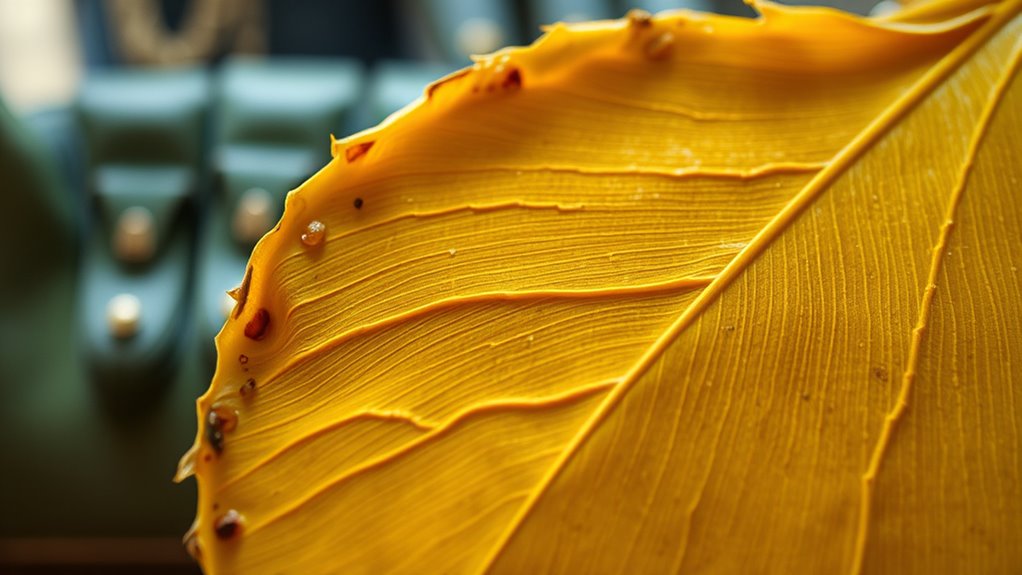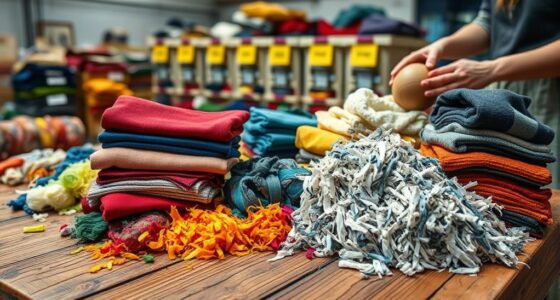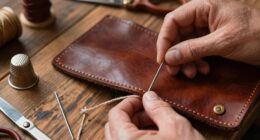Plant-based leather made from pineapple leaves transforms agricultural waste into a stylish, eco-friendly material. By processing these leaves, you can create durable, leather-like fabric that reduces reliance on traditional leather and minimizes environmental impact. This innovative approach supports sustainable farming, conserves resources, and promotes fair practices. If you keep exploring, you’ll discover how this sustainable material is reshaping the fashion world and offering exciting new options for eco-conscious consumers.
Key Takeaways
- Pineapple leaves are harvested as agricultural waste, repurposed into a sustainable, leather-like fabric through eco-friendly processing.
- The transformation involves cleaning, processing, and crafting fibers into durable, flexible material resembling traditional leather.
- This plant-based leather reduces water, chemical use, and environmental impact compared to conventional tanning methods.
- It supports local farmers by utilizing crop byproducts, promoting social responsibility and ethical manufacturing.
- The resulting fabric offers a fashionable, eco-friendly alternative, enabling brands to produce stylish, sustainable products.

As awareness of environmental issues grows, plant-based leather has emerged as a sustainable alternative to traditional animal-derived materials. You might not realize it, but this innovative material is transforming the fashion industry by offering eco-friendly options that don’t compromise style or quality. One of the key advantages of plant-based leather is its commitment to sustainable sourcing. Instead of relying on livestock, which demands vast amounts of water, land, and feed, manufacturers are turning to renewable plant fibers, like pineapple leaves, to create durable and fashionable materials. By utilizing agricultural waste, such as pineapple leaves that would otherwise be discarded, producers reduce waste and lessen the environmental impact associated with conventional leather production. This approach not only conserves resources but also supports local farmers and communities who can benefit financially from repurposing their crop byproducts.
Plant-based leather from pineapple leaves offers a sustainable, stylish alternative that benefits farmers and reduces environmental impact.
In addition to sustainable sourcing, ethical manufacturing practices play a crucial role in the appeal of plant-based leather. You’ll find that many companies prioritize transparency and social responsibility, ensuring that their production processes minimize harm to the environment and treat workers fairly. Since pineapple leaf leather is made through a process that involves less water, chemicals, and energy compared to traditional tanning methods, it aligns well with ethical manufacturing principles. This means you can feel good about choosing products that are produced with respect for both the planet and its people. Furthermore, the use of natural fibers reduces the reliance on toxic dyes and chemicals, further decreasing the ecological footprint of the final product. Incorporating fraud detection techniques such as real-time monitoring and machine learning not only enhances security but also ensures the integrity of supply chains involved in sustainable manufacturing.
The process of transforming pineapple leaves into leather-like material is innovative and efficient. After harvesting, the leaves are cleaned, processed, and turned into a flexible, durable fabric suitable for a variety of fashion items. These plant-based leathers often mimic the look and feel of traditional leather, giving you stylish options without the associated ethical or environmental concerns. As more brands adopt these sustainable methods, you’ll notice a growing range of products that are not only eco-friendly but also trendy and high-quality.
Ultimately, by choosing plant-based leather made from pineapple leaves, you’re supporting a shift toward more responsible fashion practices. You get to enjoy the luxury and durability you expect from leather while contributing to a healthier planet. This sustainable, ethical approach to manufacturing addresses both environmental challenges and social responsibility, making it a smart choice for conscious consumers like you who want to wear their values.
Top picks for "plant leather pineapple"
Open Amazon search results for this keyword.
As an affiliate, we earn on qualifying purchases.
Frequently Asked Questions
What Is the Environmental Impact of Pineapple Leaf Leather Production?
You might wonder about the environmental impact of pineapple leaf leather production. It generally promotes sustainable sourcing, utilizing what would otherwise be waste, reducing landfill burden. By turning pineapple leaves into leather, you help cut down on waste and lessen environmental harm compared to traditional leather. This eco-friendly process supports waste reduction and minimizes water and chemical use, making it a greener alternative that benefits both the planet and your eco-conscious choices.
How Durable Is Pineapple Leaf-Based Leather Compared to Traditional Leather?
Imagine a material that promises to stand the test of time like traditional leather. You’ll find that pineapple leaf-based leather boasts a solid durability comparison, with impressive material strength that resists wear and tear. While it may not match the centuries-old resilience of traditional hides, it’s still a tough contender, offering a sustainable alternative that’s resilient enough for everyday use and stylishly eco-friendly.
Can Pineapple Leaf Leather Be Customized for Different Fashion Styles?
You can definitely customize pineapple leaf leather for different fashion styles. It offers a variety of color options, from natural hues to vibrant shades, allowing you to match your unique aesthetic. Texture variations are also achievable, giving you options like smooth finishes or more textured looks to suit casual or formal styles. This flexibility makes pineapple leaf leather a versatile choice, letting you create truly personalized fashion pieces.
Is Pineapple Leaf Leather Suitable for All Types of Footwear?
You might wonder if pineapple leaf leather fits all footwear types. It offers impressive fashion versatility and style adaptability, making it ideal for sneakers, sandals, and even formal shoes. Its durability and eco-friendly qualities ensure it performs well across various designs. While it may not be suitable for every extreme style, its flexibility makes it a great choice for many footwear options, blending sustainability with high fashion.
What Brands Are Currently Using Pineapple Leaf Leather in Their Collections?
You’ll find several brands embracing pineapple leaf leather in their collections, highlighting their commitment to fashion sustainability and material innovation. Companies like Stella McCartney, Piñatex, and other eco-conscious designers are leading the way, seamlessly integrating this innovative material into footwear and accessories. Their efforts showcase how plant-based leather can elevate style while reducing environmental impact, inspiring you to choose brands that prioritize sustainability and cutting-edge material use.
Conclusion
As you explore the world of plant-based leather, remember it’s like planting seeds for a greener future. By turning pineapple leaves into fashion gold, you’re not just making stylish choices—you’re sowing the roots of change. Every piece you wear becomes a leaf in the tree of sustainability, growing stronger with each conscious step. Embrace this revolution, and watch how your choices can blossom into a more beautiful, eco-friendly world.










